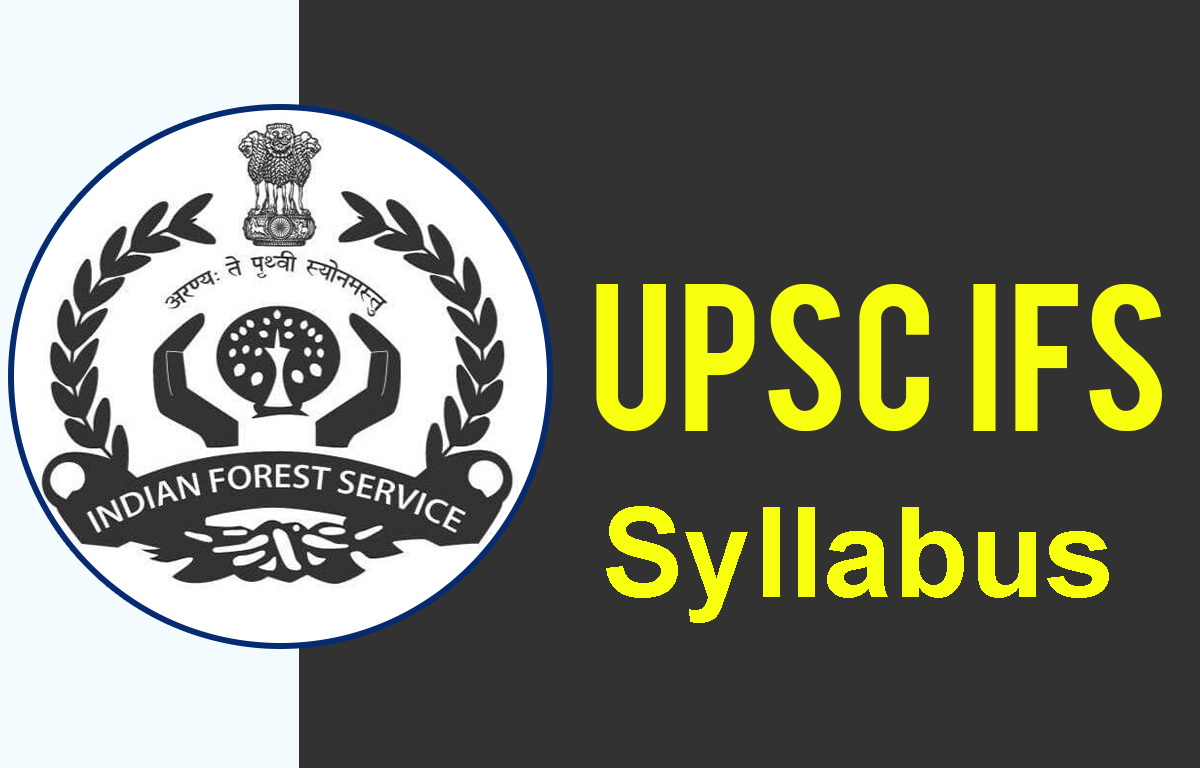Are you gearing up for the UPSC IFS Exam 2026 and wondering where to start? The Indian Forest Service (IFS) examination, conducted by the Union Public Service Commission (UPSC), is a gateway to a rewarding career in forest conservation, wildlife management, and environmental protection. With the UPSC Prelims 2026 scheduled for May 24, 2026, understanding the UPSC IFS Syllabus 2026 is your first step toward success. This comprehensive guide breaks down the syllabus, exam pattern, and preparation strategies to help you navigate this prestigious exam efficiently.
Whether you’re a beginner or refining your strategy, mastering the syllabus ensures focused preparation. Let’s dive into the details!
What is the UPSC IFS Exam?
The UPSC Indian Forest Service (IFS) is one of India’s premier civil services, focusing on sustainable forest management and biodiversity conservation. Unlike the broader Civil Services Examination (CSE), the IFS emphasizes forestry and environmental sciences. The exam recruits around 150 officers annually, making it highly competitive yet achievable with the right approach.
The selection process mirrors the CSE structure: Prelims, Mains, and Interview. Importantly, the IFS Prelims is identical to the CSE Prelims, allowing candidates to attempt both with one application. The UPSC Notification 2026 is expected on January 14, 2026, with Mains tentatively in August 2026.
UPSC IFS Exam Pattern 2026: An Overview
The UPSC IFS Exam Pattern 2026 consists of three stages, totaling 1,400 marks for the written exam plus 300 for the interview. Here’s a quick breakdown:
| Stage | Papers/Description | Marks | Type |
|---|---|---|---|
| Prelims | GS Paper I (Merit-based) GS Paper II (CSAT – Qualifying) | 200 200 (33% min.) | Objective (MCQs) |
| Mains | General English General Knowledge Two Optional Subjects (2 papers each) | 300 300 200 each (x4) | Descriptive |
| Interview | Personality Test | 300 | Oral |
- Negative Marking: 1/3rd marks deducted for wrong answers in Prelims.
- Qualifying Nature: CSAT is qualifying; only GS Paper I counts for Prelims merit.
- Total Marks for Merit: Mains (1,400) + Interview (300) = 1,700.
This pattern remains unchanged from previous years, as per the official UPSC guidelines.
Detailed UPSC IFS Syllabus 2026: Prelims
The UPSC IFS Prelims Syllabus 2026 is a screening test shared with CSE. Focus on current affairs, especially environment-related topics, as they align with IFS’s core.
GS Paper I (200 Marks, 2 Hours)
- Current Events: National and international importance (e.g., climate summits, biodiversity reports).
- History of India & Indian National Movement: Ancient to modern, with emphasis on freedom struggle.
- Indian & World Geography: Physical, social, economic geography; environmental geography (forests, ecosystems).
- Indian Polity & Governance: Constitution, political system, Panchayati Raj, public policy, rights issues.
- Economic & Social Development: Sustainable development, poverty, inclusion, demographics, social sector initiatives.
- General Issues on Environmental Ecology, Biodiversity & Climate Change: Basics of ecology, conservation, climate impacts (no subject specialization required).
- General Science: Basic concepts and applications.
GS Paper II (CSAT – 200 Marks, 2 Hours, Qualifying)
- Comprehension: English/Hindi passages.
- Interpersonal Skills: Communication, emotional intelligence.
- Logical Reasoning & Analytical Ability: Puzzles, syllogisms.
- Decision-Making & Problem-Solving: Ethical dilemmas.
- Basic Numeracy: Numbers, orders of magnitude (Class X level).
- Data Interpretation: Charts, graphs (Class X level).
Pro Tip: Aim for 90-100 in GS Paper I for a safe Prelims cut-off (based on trends). Practice 50-60 mock tests to build speed.
UPSC IFS Mains Syllabus 2026: In-Depth Breakdown
The UPSC IFS Mains Syllabus 2026 is unique, with compulsory papers tailored to forestry and four optional papers. Total duration: 3 days, November 2026 (tentative).
Paper I: General English (300 Marks, 3 Hours)
- Comprehension, précis writing, usage and vocabulary.
- Short essays on given topics.
- Grammar: Sentence structure, synonyms/antonyms.
This tests basic English proficiency—practice daily reading from The Hindu.
Paper II: General Knowledge (300 Marks, 3 Hours)
- Current events of national/international importance.
- History (India & World): Cultural heritage, modern history.
- Geography: Physical, economic, social; Indian physiography.
- Indian Polity & Economy: Constitution, governance, planning.
- Science: General principles, everyday applications.
- Special Focus: Environmental issues, forestry policies (e.g., National Forest Policy 1988).
Optional Subjects (Choose Two from 14 Options, 200 Marks Each Paper, 3 Hours Each)
Popular choices include Agriculture, Forestry, and Zoology due to IFS relevance. Key options and highlights:
| Optional Subject | Key Topics |
|---|---|
| Agriculture | Agronomy, soil science, crop production, extension education. |
| Botany | Plant diversity, physiology, ecology, economic botany. |
| Chemistry | Organic/inorganic chemistry, environmental chemistry. |
| Forestry | Silviculture, forest management, wildlife biology, agroforestry. |
| Geology | Mineralogy, structural geology, environmental geology. |
| Mathematics | Algebra, calculus, differential equations. |
| Physics | Mechanics, optics, thermodynamics. |
| Statistics | Probability, sampling, statistical inference. |
| Zoology | Animal diversity, ecology, economic zoology, biotechnology. |
Other options: Animal Husbandry, Chemical Engineering, Civil Engineering, etc. Select based on your background—Forestry often yields higher scores for IFS aspirants.
Note: Unlike CSE, no GS papers or essay in IFS Mains. Download the official PDF from upsc.gov.in for full details.
UPSC IFS Interview 2026: Personality Test
The 300-mark interview assesses your suitability for forestry roles. Expect questions on:
- Environmental policies (e.g., Project Tiger, REDD+).
- Current affairs in ecology.
- Personal background and motivation for IFS.
Panel focuses on leadership, integrity, and awareness of India’s biodiversity challenges. Practice with mock interviews.
Preparation Tips for UPSC IFS Syllabus 2026
- Build a Strong Foundation: Start with NCERT books (Class 6-12) for basics. Cover environment from Shankar IAS.
- Current Affairs Mastery: Read Yojana, Down to Earth; follow PIB for forest policies.
- Optional Selection: Choose overlapping subjects (e.g., Botany + Forestry) to save time.
- Practice & Revision: Solve PYQs; join test series from Vajiram or Vision IAS.
- Time Management: Allocate 6-8 months for Prelims, 4 months for Mains.
- Health & Mindset: Balance study with exercise—IFS demands fieldwork resilience.
With 16 months until Prelims, consistency is key. Track updates via the UPSC app.
Frequently Asked Questions (FAQs) on UPSC IFS Syllabus 2026
1. Is the UPSC IFS Syllabus 2026 different from 2025?
No major changes expected; it’s stable as per UPSC trends. Check the official notification in January 2026.
2. Can I choose any optional subject for IFS Mains?
Yes, from the 14 listed. Prioritize science/forestry backgrounds for edge.
3. What is the eligibility for UPSC IFS 2026?
Bachelor’s in science/engineering (specific streams like Animal Husbandry, Forestry). Age: 21-32 years.
4. How to download UPSC IFS Syllabus PDF 2026?
Visit upsc.gov.in > Examinations > Indian Forest Service > Syllabus.
5. What are the expected vacancies for IFS 2026?
Around 150, similar to 2025.
Conclusion: Your Path to Becoming an IFS Officer Starts Here
The UPSC IFS Syllabus 2026 is vast but conquerable with strategic planning. Focus on environment-centric topics, practice rigorously, and stay updated. Success in IFS isn’t just about cracking the exam—it’s about committing to India’s green legacy. Start today, and who knows? You could be leading conservation efforts by 2027!

Hi, I’m Varun Pathak, the founder of TheSarkariNaukri.com—a dedicated platform for the latest updates on government jobs (Sarkari Naukri) in India. With years of experience curating reliable information on job vacancies, admit cards, exam results, and preparation strategies, I help thousands of aspirants navigate the competitive world of public sector opportunities. Passionate about job security, career growth, and empowering freshers for roles like IAS, IPS, and PSU positions, I update the site regularly with actionable insights for 2025 and beyond. Let’s connect to turn your career dreams into reality!
